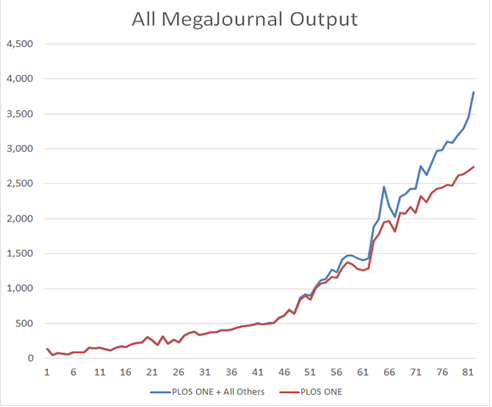The yet unnamed journal will try and challenge the likes of Plos-One and Scientific Reports for the top of the open access tables.
The term megajournal is used for a peer reviewed open access journal which includes a diverse selection of topics. The low selectivity of topic choices is not to be confused with poor quality, it means that the topics covered are wide ranging but all have to meet high quality standards. It is estimated that the top 20 megajournals produce 4,000 articles a month, some 2.5% of the total scholarly articles published.

The use of megajournals or open access publications may not be the first place physiotherapists look for new research to influences their practice. However a search of [(everything:”physiotherapy”)] ] into Plos One yields some 1,163 results and after a quick scroll through most seem relevant to clinical practice. As Selena Horner suggested in a recent Physiospot post, perhaps their is a rising demand for open access in physiotherapy. With UCL offering courses in physiotherapy perhaps there may be a tendency for therapists to publish within this new offering.
But what is a Mega Journal?
- Covers a broad range of subjects
- Accepts articles for publication based on their technical quality rather than perceived importance
- Uses article processing charges or APCs to cover the cost of publishing
Is it too good to be true?
A number of academics around the world are moving towards using megajournals as a publishing option. This is because of they tend to have a quicker review and publication process as well as having a number of respected academic editors on the editorial board. For you or I, one of the major bonuses is the use of reusable graphics and data through Creative Commons licenses.
Plos One, which launched in 2007, is the prototypical megajournal and really has disrupted the academic landscape, and it will be interesting to see how UCL can continue to shift publications towards open access. An avenue UCL is exploring is the inclusion of an open access textbook platform, which is a challenge to the book industry. Many books are available to read now.
As with all open access journals there are those predatory journals which try and take advantage of unwitting authors trying to take their first steps into the world of academia. Jeffrey Beall wrote piece about this issue in 2013 which highlights a few names to avoid. Sadly they are all still running.
Regardless of name or ‘brand’ megajournals tend to grow month on month and it will be interesting to see if a name like UCL can grow even faster and catch up with the likes of Plos One in the next few years.
The megajournal is currently unnamed, what would you call it?